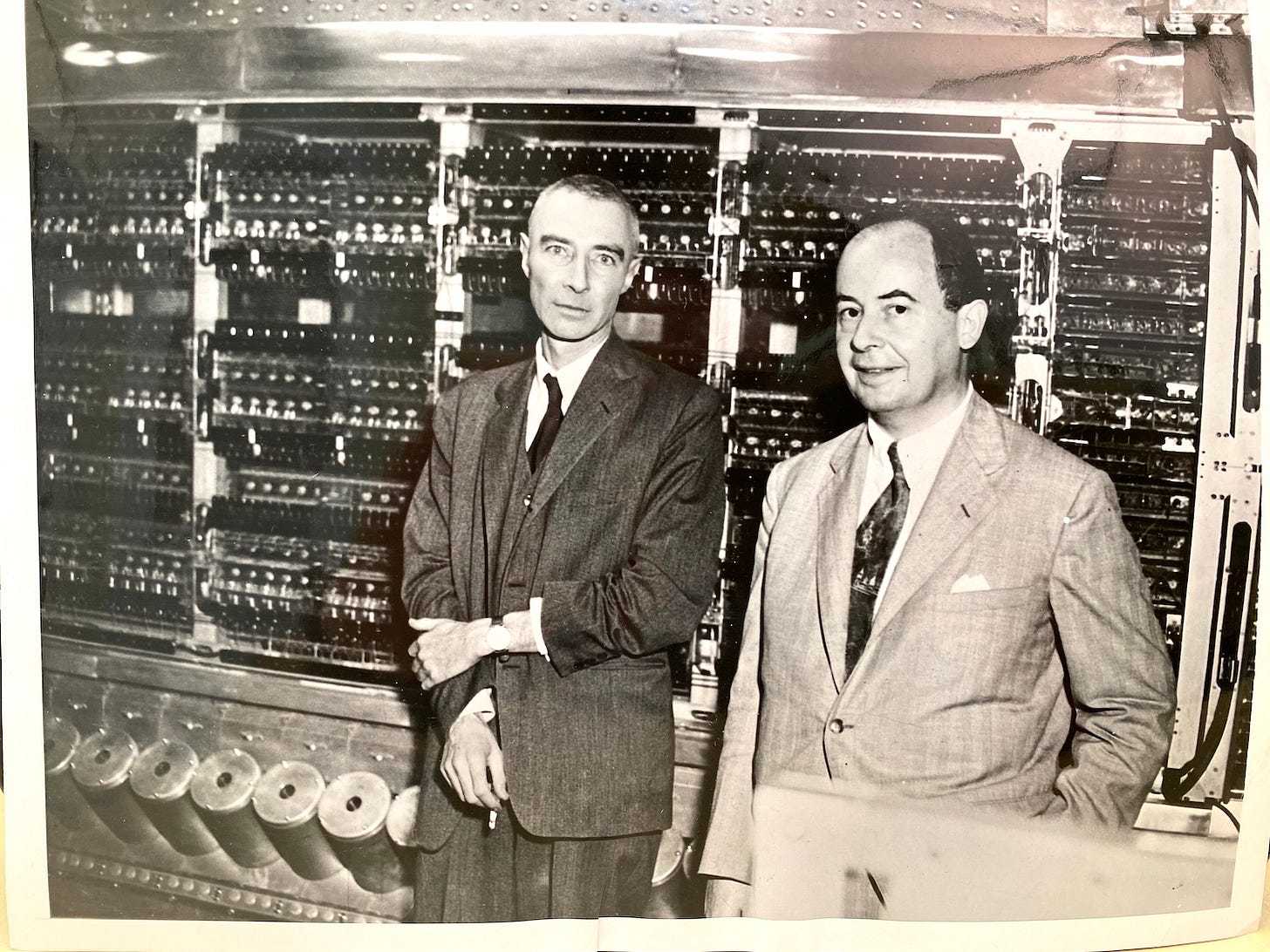📖 The Man from the Future, The Visionary Life of John von Neumann
A superlatively-written biography of the most important man you likely never heard of.
I typically try and keep these posts brief but this book has a bit of a personal story behind it so bear with me.
Many years ago I picked up a copy of “The Idea Factory: Bell Labs and the Great Age of American Innovation” by Jon Gertner. It was well written and told an important story. But there was something more important buried deep inside which was the rich cast of characters that created the world we live in today who are generally unknown or typically absent in modern day conversations. For example, you may not have heard of Claude Shannon but he’s the reason you’re reading this online right now. Claude Shannon is credited as the father of Information Theory which he achieved while at Bell Labs. He’s the guy who figured out how to make bits and bytes flow back and forth effectively before there were any real computers to tinker with. I can’t think of a single instance where I’ve heard his name brought up outside of the one episode of Tim Harford’s Cautionary Tales.
And while Claude Shannon and many other historical figures stood out, few compared to the almost impossible to describe genius of John von Neumann. He’s a historical character I’ve carried around with me ever since, reading up on him in my off time. von Neumann’s impact on the mid-twentieth century innovation boom cannot be exaggerated. His achievements range from conceiting artificial intelligence to designing the modern computer architecture schema to developing the basis for game theory to pulling J. Robert Oppenheimer out of a ditch by developing the shaped charge that would ultimately solve the ignition problem the Manhattan Project team struggled with. As one blog put it, “Von Neumann’s contributions to science, mathematics, and early computing are countless. His gift for applied mathematics took his works in directions that influenced quantum theory, automata theory, economics, and even defense planning.”
“Von Neumann’s contributions to science, mathematics, and early computing are countless. His gift for applied mathematics took his works in directions that influenced quantum theory, automata theory, economics, and even defense planning.”
Yet if you were to stop the average person on the street and say his name, you’d likely just receive a blank stare. Alan Turing? Sure. And while Turing’s works were critically important, his body of work pales in comparison (admittedly due to his persecution as a homosexual and subsequent suicide).

What was perhaps most compelling about von Neumann’s historical character was how he was a blend of genius and larger than life personality whether that be his attitude towards exercise (he told his wife he’d divorce her if she made him take walks with her), his excitable social demeanor (he would often introduce himself with a hearty, “call me Johnnie!”) or the fact he’s a secret cult movie icon (von Neumann was reportedly the inspiration for Peter Seller’s Dr. Strangelove character). To that point, his death was as complex as the life he led. Von Neumann died slowly of bone cancer. Many suspect it was the result of his time spent working on the Atomic Bomb. In his final days the mind that once computed the world’s most complex challenges with seeming ease was reduced to practicing basic arithmetic with his daughter to prevent it from further decline.
It was always a real surprise that von Neumann was able to fly under the radar as much as he has. This photo I stole from Jorgen Veisdal’s Privatdozent Substack tells the story well. John von Neumann was one of the great, great minds of the 20th century yet he tends to labor in the shadows (he’s the one in the back, partially obscured with Einstein in front).

American history culture tends to want to sensationalize easily relatable individuals so it made sense von Neumann’s character might be a hard sell to the masses. I’d all but given up hope that someone would put pen to paper to tell his story in full when I came across one of the more remarkable first works I’ve ever read.
The Man From the Future is author Ananyo Bhattacharya’s first work and it was stupendous from the first page opener all the way to the sad ending underscoring how even the mightiest of us are all basically even in our last days. I cannot recommend this book enough, particularly for those enjoy science, technology or 20th century history. Description and links follow.
Book description:
“The smartphones in our pockets and computers like brains. The vagaries of game theory and evolutionary biology. Nuclear weapons and self-replicating spacecrafts. All bear the fingerprints of one remarkable, yet largely overlooked, man: John von Neumann.
Born in Budapest at the turn of the century, von Neumann is one of the most influential scientists to have ever lived. A child prodigy, he mastered calculus by the age of eight, and in high school made lasting contributions to mathematics. In Germany, where he helped lay the foundations of quantum mechanics, and later at Princeton, von Neumann’s colleagues believed he had the fastest brain on the planet―bar none. He was instrumental in the Manhattan Project and the design of the atom bomb; he helped formulate the bedrock of Cold War geopolitics and modern economic theory; he created the first ever programmable digital computer; he prophesized the potential of nanotechnology; and, from his deathbed, he expounded on the limits of brains and computers―and how they might be overcome.
Taking us on an astonishing journey, Ananyo Bhattacharya explores how a combination of genius and unique historical circumstance allowed a single man to sweep through a stunningly diverse array of fields, sparking revolutions wherever he went. The Man from the Future is an insightful and thrilling intellectual biography of the visionary thinker who shaped our century.”
Enjoy!




